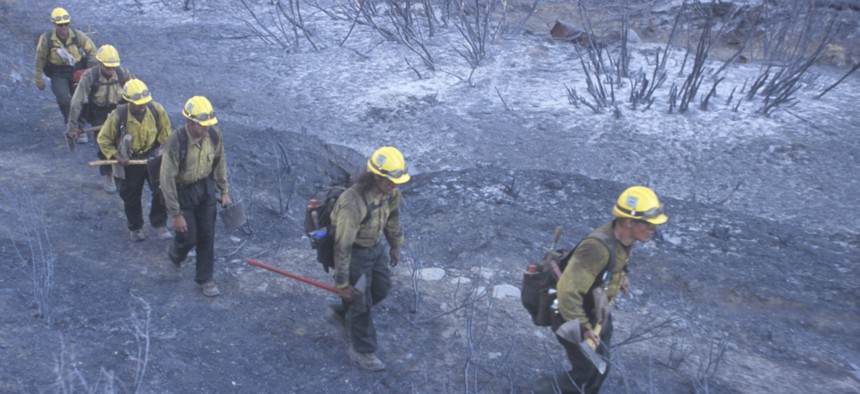California Opens a Path to Professional Firefighting for Formerly Incarcerated People

Firefighters in California walk through an area ravaged by wildfires. Shutterstock
In California, many wildfires are fought by incarcerated people trained to be firefighters. Their criminal records barred them from continuing in the field after release—until now.
As wildfires continue to rage across the West Coast and firefighting units are stretched thin, California lawmakers passed a new law that supporters say will hopefully boost the rosters of fire departments in the coming year. Signed by Gov. Gavin Newsom on September 11, the law will allow people who worked as firefighters while they were in prison to have their records expunged after release, making them eligible for firefighting jobs after their sentences are over.
For years, criminal justice reform advocates have said that California’s fire fighting system, which relies on more than 2,600 incarcerated people who volunteer to train and serve on fire crews during the season, is unfair. They’re paid a few dollars per day, and the job was only available to them while they were in prison or jail; afterwards, their criminal records effectively barred them from continuing in the field by making it nearly impossible to obtain the Emergency Medical Technician license needed to become a city or county firefighter.
California is deploying fewer incarcerated firefighters than usual this year. The coronavirus pandemic led to thousands of early releases in an attempt to prevent prisons and jails from becoming virus hot spots. Wildfires in the state reached a grim milestone today: the acreage burned has grown to an area almost the size of Connecticut.
Newsom, who signed the law after touring the town of fire-decimated town of Oroville, called the measure a “long needed reform.”
“Inmates who have stood on the frontlines, battling historic fires should not be denied the right to later become a professional firefighter,” he said. "AB 2147 will fix that.”
CA’s inmate firefighter program is decades-old and has long needed reform.
— Gavin Newsom (@GavinNewsom) September 11, 2020
Inmates who have stood on the frontlines, battling historic fires should not be denied the right to later become a professional firefighter.
Today, I signed #AB2147 that will fix that. pic.twitter.com/15GJ7Gijt7
The law only applies to formerly incarcerated people with low-level offenses on their records. Those convicted of crimes like murder, arson, kidnapping, and sexual violence are already banned from prison firefighting training programs and would be ineligible to have their records expunged after release. Expungements for those who apply are not automatic and must be approved by a judge.
Still, some law enforcement organizations opposed the measure, saying that expunged records, no matter the circumstances, are dangerous. Brian Marvel, the president of the Peace Officers Research Association of California, a group for local, state and federal law enforcement agencies, said that the law is too broad. In a statement, he said that while he “supports providing a pathway that allows low-level offenders to use the skills and experience they have developed to become firefighters once released … to fully expunge a felon’s record in exchange for this work is not warranted, is dangerous to the public and fails to recognize the impact to the victims of the inmate’s crimes.”
Assemblymember Eloise Reyes, who sponsored the measure, argued that opening up this opportunity to people who already put in the effort to train as firefighters will be a public safety benefit. She pointed to several studies that found states with the most occupational licensing restrictions have higher recidivism rates. “Signing AB 2147 into law is about giving second chances,” she said in a statement. “To correct is to right a wrong; to rehabilitate is to restore … We must get serious about providing pathways for those who show the determination and commitment to turn their lives around.”
Reyes also said that the law couldn’t come soon enough. The district she represents, which is just east of Los Angeles, has been hit hard by wildfires recently. “These individuals have received valuable training and placed themselves in danger to defend the life and property of Californians,” she said.
Brandon N. Smith, the executive director of The Forestry and Fire Recruitment Program, a nonprofit that helps formerly incarcerated people navigate the difficult path to obtaining qualifications for firefighting after release, said that the organization will now build a legal team to assist people in applying for expungement.
Smith fought fires when he was incarcerated, but couldn’t get a job at the U.S. Forest Service, CalFire, or any local fire agency after he was released. Now, he’s hopeful he has a shot at returning to combatting blazes. “I can’t wait to get back on the fire line,” he told NBC News. “I want to be out there, I want to help the community.”
Emma Coleman is the assistant editor for Route Fifty.
NEXT STORY: AI-based monitoring spots water meter issues






